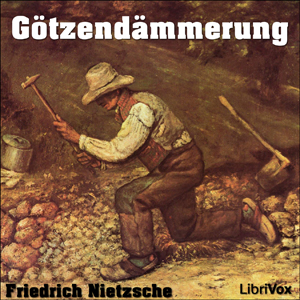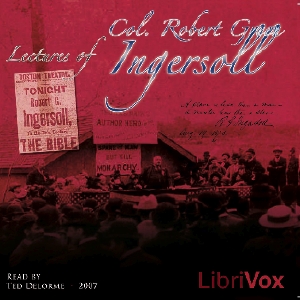The Universal Declaration of Human Rights was ratified in 1948 by the United Nations General Assembly. It defines the fundamental rights of individuals, and exhorts all governments to protect these rights. The UN has translated the document into over three hundred languages and dialects. This audiobook includes readings in 21 languages, by LibriVox volunteers. (summary by David Barnes)
Section 14 was recorded by Jennifer Larson
Section 22 was recorded by Jacek Wojski
24 episodes
Fishing with a Worm by Bliss Perry includes the poignant and philisophical observations of a fly fisherman lured by the worm. Bliss Perry was a professor of literature at Princeton and Harvard Universities and spent time in Vermont writing and fly fishing. (Summary written by Sadie, Betsie, and Wikipedia)
1 episodes
Diese kleine Schrift ist eine grosse Kriegserklärung; und was das Aushorchen von Götzen anbetrifft, so sind es dies Mal keine Zeitgötzen, sondern ewige Götzen, an die hier mit dem Hammer wie mit einer Stimmgabel gerührt wird, - es giebt überhaupt keine älteren, keine überzeugteren, keine aufgeblaseneren Götzen... Auch keine hohleren... Das hindert nicht, dass sie die geglaubtesten sind; auch sagt man, zumal im vornehmsten Falle, durchaus nicht Götze...
(aus Friedrich Nietzsches Vorwort zur Gützendämmerung)
15 episodes
Colonel Robert Green Ingersoll was a Civil War veteran, American political leader and orator during the Golden Age of Freethought, noted for his defense of atheism. This book is the first of two volumes collecting Ingersoll's speeches.
18 episodes

The Author Gilbert Keith Chesterton was born in London, England on the 29th of May, 1874. Though he considered himself a mere "rollicking journalist," he was actually a prolific and gifted writer in virtually every area of literature. A man of strong opinions and enormously talented at defending them, his exuberant personality nevertheless allowed him to maintain warm friendships with people--such as George Bernard Shaw and H. G. Wells--with whom he vehemently disagreed. Chesterton had no difficulty standing up for what he believed. He was one of the few journalists to oppose the Boer War. His 1922 "Eugenics and Other Evils" attacked what was at that time the most progressive of all ideas, the idea that the human race could and should breed a superior version of itself. In the Nazi experience, history demonstrated the wisdom of his once "reactionary" views.Chesterton wrote several works of Christian apologetics, the best known of which are "Orthodoxy", "Heretics", and "The Everlasting Man". (Summary from Project Gutenberg)
21 episodes
In this light-hearted yet thought-provoking collection of articles, Bennett offers his thoughts on exercising the mind, organising your life, the advantages (and disadvantages) of marriage and other pocket philosophies.The book stands the test of time, and much is still relevant and amusing - perhaps even more so, with nearly 100 years of hindsight, than when it was originally written.The book "X" to which Bennett refers in Chapter 5 is An Essay on the Principle of Population by Thomas Malthus, of which there is also a Librivox recording. (Summary by Ruth Golding)
9 episodes
Tractatus Logico-Philosophicus is the only book-length philosophical work published by the Austrian philosopher Ludwig Wittgenstein during his lifetime. He wrote it as a soldier and a prisoner of war during World War I. The slim volume (fewer than eighty pages) comprises a system of short statements, numbered 1, 1.1, 1.11, 1.12, etc., through to 7, intended to be such that 1.1 is a comment on or elaboration of 1, 1.11 and 1.12 comments on 1.1, and so forth. It is an ambitious project to identify the relationship between language and reality and to define the limits of science. (Summary from Wikipedia)
6 episodes
A series of biographical lectures originally published in 1850. Each chapter is a philosophical treatment of the life of an intellectual. The six representatives are Plato, Swedenborg, Shakespeare, Montaigne, Napolean and Goethe. (Introduction by S. Kovalchik)
9 episodes
A collection of readings in the readers language of choice
7 episodes
Character Building is a compilation of speeches, given by Mr. Booker T. Washington, to the students and staff of the Tuskegee Normal and Industrial Institute (now known as Tuskegee University).Booker T. Washington was one of the most prominent leaders in advancing African-American civil rights. Born into slavery and freed as a young boy, he rose through the ranks of education to eventually earn his position as principal of Tuskegee. Under his guidance, the school was built, by students and for students, to give them a deeply meaningful education. Mr. Washington stressed the importance of developing oneself for life-long success. He strived to imbue in his students the highest personal standards, and these speeches represent the core messages he gave.(Originally published by Doubleday, Page & Co., NY, in 1902. Summary by Luke Sartor)
38 episodes
Trine tells us that by connecting and harmonizing with the Universe we attract love, health, peace and success. Trines' writings may have been the most important to the "New Thought" movement of the late 1800's and early 1900's which was the forerunner to the "New Age" movement. (Summary by kirk202)
13 episodes
This little book is an attempt to explain what each soul must discover for himself, that he stands in the midst of an eternal creative power which presses itself around his own thought, and casts back to him glorified all that he thinks. If it awakens within the consciousness of one single individual the realization that the mind of the Universal (which is the only mind that there is) is his own mind that the creative power of this mind is his also; that the manifestation of this mind is his own individuality; that the love and power and peace of this mind is within himself, it will not be written in vain. May it then do much in simplifying and bringing to light some of the deeper mysteries and meanings of life. (Ernest Shurtleff Holmes)
4 episodes
Creative Evolution (French: L'Évolution créatrice) is a 1907 book by French philosopher Henri Bergson. Its English translation appeared in 1911. The book provides an alternate explanation for Darwin's mechanism of evolution, suggesting that evolution is motivated by an élan vital, a "vital impetus" that can also be understood as humanity's natural creative impulse. The book was very popular in the early decades of the twentieth century, before the Neodarwinian synthesis was developed.The book also develops concepts of time (offered in Bergson's earlier work) which significantly influenced modernist writers and thinkers such as Marcel Proust. For example, Bergson's term "duration" refers to a more individual, subjective experience of time, as opposed to mathematical, objectively measurable "clock time." In Creative Evolution, Bergson suggests that the experience of time as "duration" can best be understood through creative intuition, not through intellect. - Summary by Wikipedia
22 episodes
Primer volumen de recopilación de 408 opiniones y sentencias del célebre filósofo alemán en el que expone las principales caraterísticas de su pensamiento sobre las artes, la filosofía, la historia, la ciencia, la religión, la sociedad... Este texto incluye un prefacio en el que el autor explicita sus presupuestos e intenciones al realizar filosofía de esa manera, "a martillazos", con ese estilo tan rompedor y atractivo que le define y ha hecho tan conocido entre el gran público. El contenido de esta obra fue incluído en ediciones posteriores como un segundo volumen de "Humano, demasiado humano" - Summary by Epachuko
22 episodes













